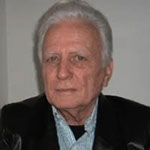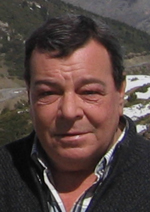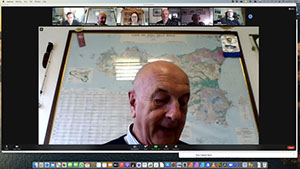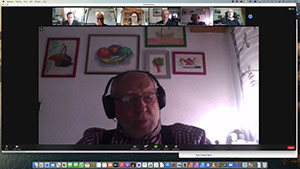


QUICK LINKS
Grants for Young Researchers
Publications
Congresses
Jobs and Studentships
Elections
Soil Conservation Projects
NEWS
Scientific and Cultural Days of Imola – 17th year, Italy
Global Soil Conference 2024, New Delhi, India
GM5.5 Geodiversity and geoheritage, Vienna, Austria
5th International Conference SCSI, India
5th WASWAC World Conference, Olomouc, Czech Republic – added link
Centennial of the IUSS, Florence, Italy
NEWS:
1. 12. 2021
Let's Go to Discover Soil Biodiversity
4. 11. 2021
Protecting the Soil is Protecting the Climate
WASWAC and IUSS Position Paper on the Interlinkages of Soil and Climate Change ![]() (3.8 MB)
(3.8 MB)
3. 10. 2021
 Professor Giancarlo Chisci
Professor Giancarlo Chisci
13 March 1929 – 20 September 2021
Born and died in Firenze (Florence) Italy
IN MEMORIAM
Giancarlo Chisci was a most inspiring and enthusiastic scientist and a privilege to work with. As the 'Father of Italian soil erosion science,' he showed just how severe erosion could be by detailed field measurements. These enabled him to demonstrate the problem to farmers and to discuss potential solutions with them, whose effects he also measured. Whilst his studies were mainly conducted in Italy, he presented research results at international conferences world-wide, which gave him and his country a deserved place on the world stage. He was a founder member of the European Society for Soil Conservation (ESSC) and he gave the Society his wholehearted support, through regularly attending its conferences. His scientific work and status were rightly honoured when he became the first to receive the ‘Gerold Richter Award for Outstanding Contributions to Soil Conservation and Protection in Europe’ from the ESSC in 1996.
Although Giancarlo was not an erosion modeller, he understood the place of models and played a vital role as a member of the research team that developed the European Soil Erosion Model (EUROSEM). He compared model outputs with the realities of erosion in the field. Where the model gave poor predictions, he could usually indicate from his experience what aspects the model was missing. When acceptable predictions were obtained, he could always indicate whether or not these were obtained for the correct reasons or just pure chance. Giancarlo also investigated pasture and herbaceous mixtures.
Giancarlo undertook a Post-Doctoral Fellowship at the Department of Statistics at Rothamsted Experimental Station (UK). He worked as a researcher at an experimental Institute in Lodi (Milan, Italy). Later, Giancarlo became Director of the Soil Physics Section of the Institute for Soil Conservation of the Italian Ministry of Agriculture (Florence, Italy). At the same time he taught a course on statistics for agronomists at the Catholic University of Pavia. He was also a member of the Italian Agriculture and Forest Sciences Committee of the Italian National Research Council (CNR), Vice Director of a CNR finalized five-year Soil Conservation Project and co-operated with the European Commission. Then Giancarlo moved for five years to the University of Palermo as full Professor in the Department of Agronomy. After that, he continued his university career at the Agronomy Department of Florence University.
Giancarlo will be remembered as a friend and a superb host. All who knew him will have fond memories of his personality and energy, which shone through everything he did and undoubtedly contributed to his reaching the grand age of 92. He encouraged other scientists, both young and old, with an enduring optimism that virtually anything could be achieved. His ability to enthuse and inspire others will be missed.
Roy Morgan1 and Dino Torri2
1Past President of the European Society of Soil Conservation, Bedford, UK.
2Firenze (Florence), Italy.
The ESSC has opened a Book of Condolences in memory of Professor Giancarlo Chisci. If you would like to add any recollections or comments please e-mail them to Professor Dino Torri at: dino.torri@irpi.cnr.it
The comments will be added to the Book of Condolences.
23. 5. 2021
The ESSC Awards 
14. 4. 2021
ESSC Executive Committee on-line meeting 23 February 2021
8. 12. 2019
In Memoriam
 Antonio Rodríguez Rodríguez
Antonio Rodríguez Rodríguez
Catedrático de Edafología y Química Agrícola
Departamento de Edafología y Geología
Universidad de La Laguna
Tenerife, Canary Islands, Spain
1952–2019
The past 21st October 2019, our colleague and friend Antonio Rodríguez Rodríguez, Professor of Soils and Agricultural Chemistry of the University of La Laguna (Tenerife, Canary Islands. Spain) passed away, at the age of 67 years. Antonio was born in Puntagorda (La Palma, Canary Islands. Spain), the 7/12/1952. He studied and graduated as Doctor in Biological Sciences on 1977, in the University of La Laguna (Tenerife, Canary Islands, Spain), under the direction of Prof. Enrique Fernández Caldas, pioneer and Worldwide authority in the study of soils of volcanic origin. Dr. Antonio Rodríguez was his collaborator in different research projects on volcanic soils, and after the retirement he followed his steps, with as prolific teaching and research career, reflected in a great number of publications product of studies about the properties, degradation processes and reclamation systems of volcanic soils in the Canary Islands, and relations with environmental problems, becoming a World reference on that field of research. In all those activities, he was accompanied as close collaborator, by Dra Carmen Arvelo, also Prof. of the University of La Laguna, and by other researchers including Dr. students under his guidance. At the time of his passing away, Prof. Antonio Rodríguez was the Coordinator of the Research Group on Soil Degradation and Conservation of the University of La Laguna (ULL), Member of the Institute of Canary Studies and Member of the Scientific Committee of the Biosphere Reserve of Fuerteventura Island (Canary Islands, Spain). Antonio has also been a very active member of Organizations like the Spanish Soil Science Society (SECS), where he was elected in several periods President of the Commissions on Control of the Degradation of Soils and their Reclamation, and of Soil and Water Conservation. He was for many years member of the Council, and co-editor of the Newsletter, of the European Society for Soil Conservation (ESSC). In activities related with those Societies, he organized different meetings and conferences, among them the ESSC Conference on "The Soil as a Strategic Resource: Degradation Processes and Conservation measures" (1995.Tenerife, Canary Islands, Spain) and edition of the book with the same title: The Soil as a Strategic Resource: Degradation Processes and Conservation mesures.Geoderma Ed. Logroño (España). (ISBN 84-87779-32-8); and the “III SECS Simposio sobre Control de la Degradación de Suelos y la Desertificación” (2007. Fuerteventura, Canary Islands, Spain) and edition of the book “Control de la Degradación de Suelos y la Desertificación”. Two years ago Antonio was one of the organizers of the post-conference tour to the Canary Islands (CONSOWA 2017, Lleida, Spain). Apart of his achievements in teaching and research activities, Antonio was distinguished by being and extraordinary, generous and good person, to whom I had the privilege to be a very good friend for many years, since 1986 when he invited me as a Visiting Professor in a Soil Salinity Course he organized in the University of La Laguna. From then we have maintained a continuous scientific and personal relations, with exchanges and cooperations between his University (ULL) and mine (Universitat de Lleida), where I could appreciate his high quality as a person. Antonio will be very well remembered, for all his teaching, research and personal qualities by a great number of colleagues, students and friends.
Ildefons Pla Sentís
Emeritus Professor of the Universitat de Lleida
President of the Comission on Control de la Degradación y Recuperación de Suelos (SECS)
Vice-President of the World Association of Soil and Water Conservation (WASWAC)
Past-President of the International Soil Conservation Organization (ISCO)
Member of the Executive Council of ESSC
18. 11. 2019
Report on the 9th ESSC International Congress
Soil's Contribution to People: from Food to Life supporting Services
Albania, Tirana, 26 – 28 September 2019
3. 11. 2019
9th ESSC International Congress
24. 04. 2017
EARTH DAY 2017: 500 organisations send an open letter to European Commission President Juncker: “In Europe, 500 hectares of land are degraded every day, a specific law to protect soils is urgently needed”
This 22nd April is an International Day of Action to collect signatures for the European Citizens' Initiative ‘People4Soil’
The letter, submitted on the occasion of Earth Day, refers to the United Nations objective to “halt land degradation globally by 2030” and is addressed to the European Commission (EC). The European Commission is asked to do its part, as European policies markedly influence the soils of the rest of the world. The call was launched by the organisers of the European Citizens’ Initiative (ECI) ‘People4Soil,’ on behalf of the 500 organisations that are promoting the ECI petition in Europe (www.people4soil.eu). They ask EC President Claude Juncker to halt land degradation and develop a dedicated legally-binding framework covering the main soil threats.
In Europe, there are 170 million hectares of agricultural soils, equivalent to approximately 39% of EU territory. Although considerable, this area is insufficient to supply food and raw materials to the European market, which claims twice the actual cultivated area. Although Europe accounts for 7% of world population, it exploits 20% of the 1.6 billion hectares of global agricultural land. High-protein food, food waste and non-food products are among the reasons for the high footprint on the lands of non-EU countries, where food security relies on smaller cultivated surfaces per capita, thus contributing to malnutrition, poverty and migration. This is the case in South America, where millions of hectares of intensive farming replaced forests and local agriculture in order to produce feed for our cattle. The same applies in sub-Saharan Africa, where European and Asian companies are grabbing land to the detriment of rural communities, generating great migratory flows.
If Europe has such a strong need for cultivated land, why should we not protect our own soils? Every day 500 hectares of soil are sealed or degraded, and in many cases the degradation corresponds to a definitive loss of this precious resource. Soil is the most precious and scarce natural resource of Europe, yet we do not protect it! Over the past 50 years, the surface covered by settlements and infrastructures in Europe has doubled to 20 million hectares; equivalent to twice the area of Hungary. There are other soil threats: 3 million contaminated sites, 10 million hectares seriously damaged by erosion and 14 million hectares at risk of desertification. If we really want the European Community to stop soil degradation, we have to start from a common framework: European legislation to protect soils is urgently needed!
An active policy to protect the soil is also a policy for security and economic development: healthy soils that are rich in organic materials improve agricultural production and increase its resilience to climate change. At the same time, ceasing to build on greenfield land is the only way to direct the real estate investments where they are needed: the regeneration of cities. It is a long-term development policy that protects European resources and heritage and is the cornerstone of climate mitigation and adaptation strategies. For this reason, on World Earth Day, the 500 organisations endorsing the open letter to Mr. Juncker call upon EU citizens to sign the European Citizens' Initiative at: www.people4soil.eu
02. 04. 2017
Economic Costs of Soil Erosion
F.J.P.M. Kwaad
07. 11. 2016
Bioeconomy Photo Competition
For more details on the competition, please see the attached flyer and visit our website: http://commbebiz.eu/cbb-2017-photo-competition. The closing date is December 5th, 2016.
![]() (185 kB)
(185 kB)
15. 8. 2016
Soil Museum / Museo del Suolo
20. 7. 2016
The World Soil Museum, ISRIC, Wageningen, The Netherlands
27. 5. 2016
The ESSC is a member of this network
http://globalsoilweek.org/golden-grounds
3. 5. 2016
To create a global soil map of tea bag decomposition
We hereby invite you to participate and determine soil decomposition using the TBI method (Keuskamp et al 2013).
![]() (260 kB)
(260 kB)
22. 3. 2016
Economic cost of soil erosion
Dear colleagues,
I would appreciate your comments on my website 'Economic costs of soil erosion':
http://www.kwaad.net/EconomicCostsOfSoilErosion.html
Best wishes,
Frans Kwaad,
former lecturer in Geomorphology,
University of Amsterdam,
The Netherlands,
http://www.kwaad.net/Kwaad-Public.htm
9. 12. 2015
Living in the Soil
A snail, a worm and a group of young people are some of the characters who star in ‘Living in the Soil,’ a comic produced in the context of ‘The International Year of Soils’ that aims to raise awareness about the most significant environmental and social issues related to soil and its need for protection. Through some 60 sketches, the authors report various aspects of the characteristics, functions and implications related to the use of this non-renewable resource. It reflects both the view of humans and the living organisms that inhabit soil. The comic, which is conceived as an educational resource, is aimed at children, the general public and students at all educational levels.
The web-links are:
Introduction (in Spanish): http://www.suelos2015.es/materiales/comic/vivir-en-suelo
Comic in Spanish:
http://www.ciudadciencia.es/doc/files/comic/COMIC%20castellano%20WEB_ok.pdf
Comic in English:
http://www.suelos2015.es/sites/default/files/pdf-materiales/living_in_the_soil.pdf
Authors: Mª Pilar Jiménez Aleixandre, Estudio Tangaraño, María Teresa Barral Silva and Francisco Díaz-Fierros V. (2015). Co-ordination: Montserrat Díaz-Raviña
Contact address:
Montserrat Díaz Raviña
Instituto de Investigaciones Agrobiológicas de Galicia del CSIC (IIAG-CSIC)
Departamento de Bioquímica del Suelo
Apartado 122
15780 Santiago de Compostela
Spain
Report by:
José Luis Rubio
Centro de Investigaciones sobre Desertificación- CIDE
(CSIC, Universitat de Valencia, Generalitat Valenciana)
Carretera Moncada-Naquera Km 4,5
Apartado Oficial
46113 Moncada
Valencia
Spain
24. 11. 2015
“Feeding the Planet, Energy for Life:" this was the core theme of ‘Expo Milano 2015’
Over six-months (1 May-31 October 2015), Milan became a global showcase, where over 140 countries exhibited the best of their technology in assuring healthy, safe and sufficient food for everyone, while respecting the Planet and its environmental equilibrium.
‘Expo Milano 2015’ provided a platform for the exchange of ideas and shared solutions on the theme of sustainable development. The cultural legacy of ‘Expo Milano 2015’ was the 'Charter of Milan.’ This is a participatory and shared document that calls on every citizen, association, company and institution to assume their responsibility in ensuring that the current and future generations can enjoy the right to food and to live in a sustainable environment.
The European Society for Soil Conservation (ESSC) fully supports the Charter of Milan. The Charter was signed by ESSC President Professor Carmelo Dazzi (University of Palermo, Italy) on behalf of the ESSC.
The ‘Charter of Milan’ is available at:
http://carta.milano.it/the-milan-charter/
Thought for the month
“Planet Earth has no tourists”
(Richard Templar, 2006).
©2014 European Society for Soil Conservation. The owner of the content of this website is the European Society
for Soil Conservation (ESSC) and can only be used with the consent of the owner of this website or members of the ESSC.

